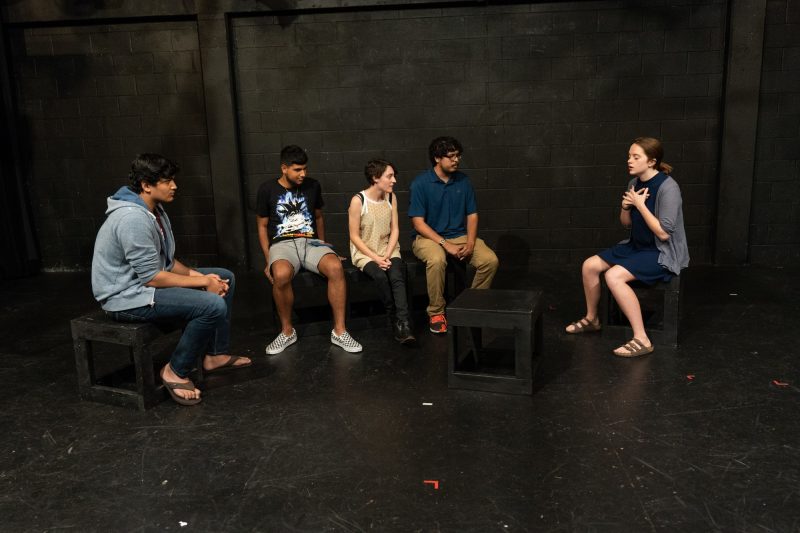Trinity University students and faculty worked with members of the San Antonio community this summer to create a Theatre production entitled “End Stigma, End HIV/AIDS: A Forum Theatre Project.” Across multiple performances, the show aimed to combat intense stigma faced by those living with HIV, which often acts as an obstacle to treatment.
As a part of the Mellon Initiative Research Fellowship summer program at Trinity, those involved in the production constructed scenes based on 33 interviews with members of the community living with HIV. These interviews, assembled by Robert Huesca, professor of communication, gave insight into the stigma experienced by those living with HIV.
“This was an intervention designed to reduce the stigma surrounding HIV testing, AIDS and AIDS treatment,” Huesca said. “Stigma is the most important social factor that prevents people from getting tested and treated for HIV. If everyone infected with the virus could be identified, HIV could be eliminated.”
The scenes performed by the actors were written to portray what the researchers had observed to be the most common situations in which those living with HIV encounter stigma: Situations among family members and situations while seeking treatment. After viewing scenes in which the performers depicted oppressive events in those common situations, it was up to members of the audience to intervene in the oppression. This type of audience participation was based upon Brazilian theater practitioner Augusto Boal’s concept of Forum Theatre.
“No matter what the topic is, people don’t want other people to be oppressed. Seeing that in a controlled environment where they can speak up like it’s okay,” said Syne Barr, a senior who participated as a cast member. “I think it will then translate into real life.”
In observing the effect of the show on the audience, those involved confirmed that the performances fostered empathy and awareness of the experiences of those living with HIV.
“Audiences were intensely responsive. People regularly came up to me and other cast members to tell us how powerful they found the play,” Huesca said.
The show was performed for a variety of patrons this summer, including performances that took place primarily for an audience of service providers working within the field of HIV/AIDS treatment and shows for general audiences. One performance was also done for Fiesta Youth, an LGBTQ+ youth group in San Antonio.
“That was our last performance, and they were amazing. It doesn’t matter, your knowledge on the subject. It was just people speaking up,” Barr said. “The kids were interesting because they did it in different ways than the adults did. They incorporated more humor, and they were even more supportive.”
The researchers attested to the success of the project in educating members of the community on HIV/AIDs and opening up a path to understanding situations of oppression.
“We had audiences who didn’t know anything about HIV or AIDS, and those were some of the best ones particularly because you got to actually see them learn and ask questions,” said Julia Palmer, a senior who participated as a cast member.
If you didn’t get a chance to see the production this summer, Palmer still has some advice for you on how to begin to move past the stigma.
“Get tested! It’s very easy; you can do it for free. Ask for the whole sweep because a lot of the times they will just test for a couple of things,” Palmer said. “One of the biggest takeaways about HIV is that it’s not a death sentence, and you can live a long, healthy life.”
For further information on HIV/AIDS education and testing, the San Antonio AIDS Foundation is an extensive resource which can be found at sanantonioaids.org.







